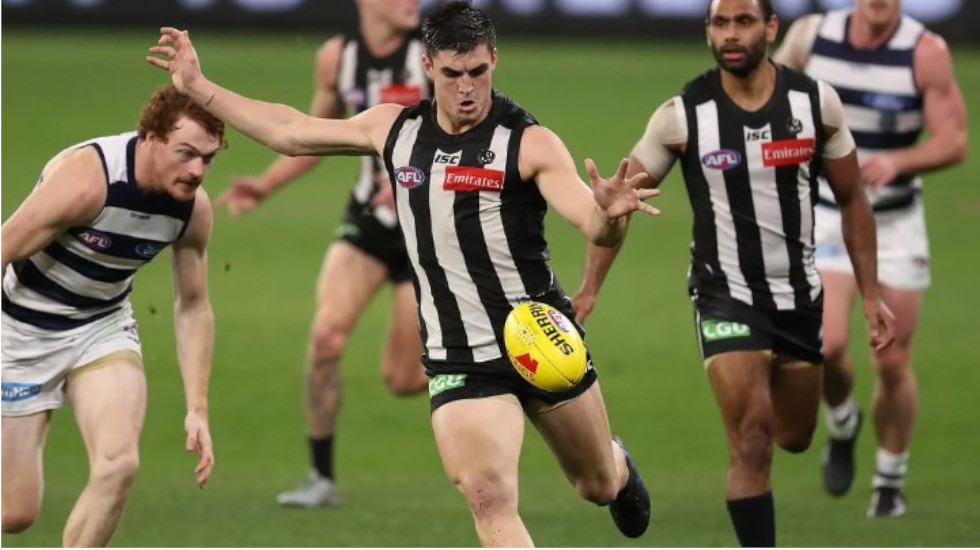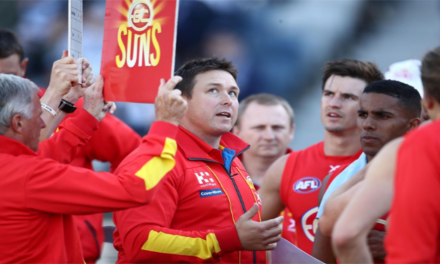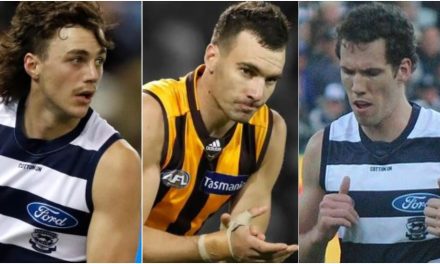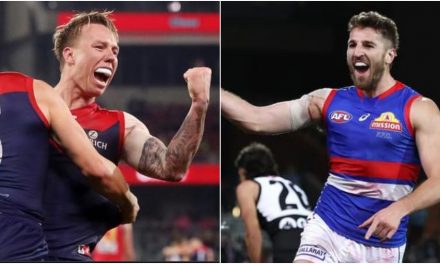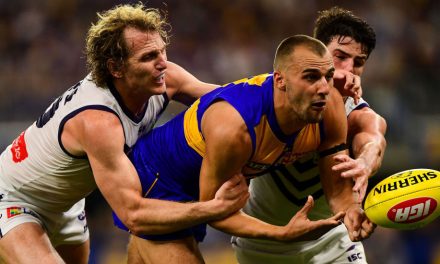Brayden Maynard clears Collingwood’s defensive lines during last week’s win over Geelong. Photo: GETTY IMAGES
In this most defensive of AFL seasons, where goals are drying up in some games to the point they’re about as regular as rugby league tries, it would make sense that the best defensive team would win the flag.
If so, we may as well start engraving C-O-L-L … on that big, silver premiership cup for a 16th time. Defence supposedly wins championships, after all.
The Magpies have set the defensive standard over the first seven rounds, and have so far maintained their level without injured All-Australian backman Jeremy Howe.
They have restricted opposition teams to five goals or less in five of seven games this season and their average score conceded (42.6 points) is almost a goal better than their nearest rival, ladder leader Port Adelaide (48.3).
In Howe’s absence, we can draw parallels to Alex Rance going down at Richmond last year, and Brayden Maynard’s rapid rise to stardom over the past few weeks isn’t dissimilar from Dylan Grimes’ sudden surge in popularity during the Tigers’ reign.
Of course, Maynard has been valued highly within black-and-white walls for a lot longer than that. The Magpies were singing his praises long before he was edged out of that Grand Final marking contest by Willie Rioli.
Darcy Moore has emerged as a genuine All-Australian contender and Jordan Roughead and Jack Crisp have been important, while Isaac Quaynor has come in since Howe’s injury and stamped himself as a young star in the making.
Collingwood’s system has held up so far. Last week, the Pies put the freeze on the competition’s best attack when they held Geelong to five goals. That sort of form can put them firmly in the premiership picture.
But what if, just maybe, one club went against the grain. Forget thinking outside the box, which club can tear the thing in half and shove it in the recycling bin?
We’re talking about all-out attack. In a football world heavy on defensive systems and teams trying not to lose, which coach has the talent, guts and desire at his disposal to actually go out and win the game?
It may well be Nathan Buckley, whose Magpies at their best are as dangerous, hungry and rich in options in the front half as they are cool, reliable and ferocious at the back.
But Carlton (in round six) is the only team in the last 48 games played across the competition to register a triple-figure total on the scoreboard.
Only St Kilda, Gold Coast (twice), the Bulldogs and Melbourne have cracked 90 in that same time frame. Three of those tallies came in round seven, in what we hope will be a pointer of some more attacking football to come.
But another trend out of round seven is one we hope vanishes as quickly as it appeared. Unfortunately, that might not be the case.
Strict new holding the ball adjudications are now having such an impact that they’re resulting in players standing back and accepting being second to the ball. The combatants are doing so in the belief that is ultimately the better way to get their hands on it.
The theory is that it’s now easier to tackle someone and win a free kick than it is to get the ball yourself and attempt to deliver it to a teammate the old-fashioned way. Taylor Walker admitted as much when he fronted the media on Tuesday.
“You can clearly see that blokes are now thinking twice about: ‘Do I get the ball and then get tackled, or do I let someone else get it and I’ll tackle them?’ It has certainly played a part in the way people are playing,” Walker said.
It’s a huge issue going forward, and drastically changes one part of the fabric of the game, as noted by Brett Ratten after his St Kilda side knocked off Adelaide.
“We have to be careful that we don’t have players just sitting there and ready to tackle players. That’s not the way that we want to play the game,” Ratten said
The AFL – and by extension the umpires – has since admitted it got a few calls wrong on Monday night during a game that frustrated the heck out of many supporters, let alone players and coaches.
AFL footy boss Steve Hocking says the league “will continue to work towards ensuring stronger consistency in decision making”, with a particular focus on holding the ball decisions.
We can only hope they achieve that consistency, because, right now, it’s an absolute lottery.

